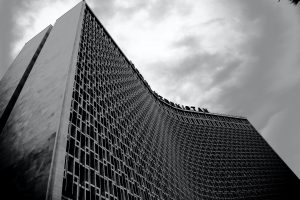A Singaporean holding company bought a majority stake in Hotel Uzbekistan, a landmark building in Tashkent, the country’s capital, as the Uzbek government’s privatization plans continue.
Bashan Investment Group PTE Ltd will pay $23.2 million for an 80.13 percent stake in the hotel ownership. Bashan is both a holding and a television production company founded in 2005.
In 2018, the Uzbek government issued a decree in an effort to attract foreign investment into its hotel assets and in February 2019, it advertised an auction for its Hotel Uzbekistan stake starting at 100 billion soums ($33 million). The auction attracted no interest and the government decided to gradually decrease the price. Under the terms of the contract, Bashan will have to invest 100 billion soums for the renovation of the building in the next 18 months.
Bashan beat out the other five companies that bid on the tender. The companies originated from the U.K., Turkey, and the UAE, but the State Asset Management Agency did not reveal their names.
Soviet architects completed the building in 1974. The curved shapes of its concrete blocs towered over the Square of the Revolution, later renamed after Amir Timur when a statue of the warrior was erected in 1994 to replace a granite statue of Karl Marx’s head.
Otel O’zbekistan LLC, the company that owns the hotel, had been profitable for the three years before the tender was announced in 2019 and showed no overdue debt.
The State Asset Management Agency said that, in the first five months of 2020, the state had successfully privatized 299 state-owned assets, including Hotel Uzbekistan and the Chorsu Hotel near the capital’s main market. The government is now considering inviting a foreign company to manage state-owned Uzbekistan Airways and its sister company managing the country’s airports, after the lockdown during the global COVID-19 pandemic hit the aviation industry.
Privatization in Uzbekistan is heralded for two main reasons: It funnels hard currency into state coffers and it signals a fertile business environment for potential investors. The government needs to publicize both, as its currency has proved chronically weak against the U.S. dollar and the “new course” devised by President Shavkat Mirziyoyev aims to make Uzbekistan the new focus of foreign investment into Central Asia. Neighboring Kazakhstan has in fact been comparatively more successful in privatizing state assets, only because of the lack of competition in the region and the foreign investors’ focus on its natural resources.
Still, foreign investment in Central Asia often looks suspiciously circular, possibly originating from the home country, re-routed through offshore companies, and re-invested in the country. These speculative moves are often used either to conceal the final beneficiary of the deal or to launder money. “Customers” in the British Virgin Islands are a major buyer of Kazakhstan and Tajikistan‘s exports; mailbox companies with one or two registered employees in offshore locations own stakes in several major enterprises across Central Asia. Until recently, a holding in Singapore connected to one of Kazakhstan’s richest men owned Almaty International Airport, the busiest airport in the region.
An investigation by openDemocracy in 2018-2019 unveiled that the “foreign investors” into a $1.3 billion development project in Uzbekistan’s capital were not actually “foreign.” The Tashkent City project, which caused the demolition of two old neighborhood in the capital, was being built with funds originating from a German firm and a Scottish company (now dissolved), ultimately connected to businessmen from the region. Overall, the Tashkent City project is closely connected to Jaxongir Artikxodjaev, the mayor of Tashkent.
Despite the frequent publicity regarding privatization, it appears rather odd that a little-known film production company from Singapore would be interested in purchasing Tashkent’s landmark hotel. By not publishing the names of the other companies participating in the tender, the State Asset Management Agency contributed to keeping the deal opaque enough to raise eyebrows both in the country and among foreign businessmen.

































